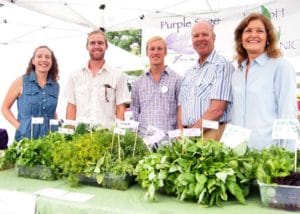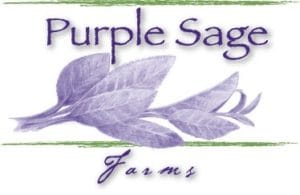Purple Sage Farms’ Quest for Success
[This article was previously published in the winter issue of The Cultivator, Cornucopia’s quarterly newsletter.]
by Rachel Zegerius
Communications and Development Associate at The Cornucopia Institute
 |
Organic farmers Tim Sommer and Tamara Sloviaczek are deeply connected to their family, their community, their customers, and to the many ecological systems with which they interact daily.
For many organic farmers, such connections are the lifeblood of a successful business. For Tim and Tamara, the founders of Purple Sage Farms, many of these connections did not exist in 1988, when the pair of corporate marketing professionals returned home to Idaho to pursue a love of farming.
At that time, there was no organic certification program in their state, there was no cooperative marketing infrastructure, and the local food movement had yet to take hold.
Since then, not only has this duo developed a successful herb farm, but through years of advocacy, organizing, and hard work, they have helped spark the good food movement in southwestern Idaho.
While embarking on their own organic farm venture, Tim and Tamara simultaneously collaborated to organize Idaho’s existing organic farmers into the Idaho Organic Growers Association.
This collective then spearheaded the creation of the Idaho Department of Agriculture’s Organic Certification Program, which now certifies over 230 operations throughout the state.
They also played a pivotal role in the development of Idaho’s Bounty Co-op, a healthy and growing member-owned and -operated cooperative which provides web ordering, distribution, and marketing systems for local farmers who did not previously have access to an established food distribution system.
For Tim and Tamara, farming has uncovered a mycelium-like network of connections. Farming organically has called on their own skills as ecologists, economists, policy makers, and marketing professionals. And the apples have not fallen far from the tree.
All three of the Sommer children are now college educated, effective problem solvers, and.…farmers. Tim jokes about his sons and daughter, “They grew up on the farm and worked for free, in essence. I guess the tradeoff is that they each received a bachelor’s degree.”
“The kids bring enthusiasm for diversity of new and different crops,” he adds. They have helped develop the farm into what it is today. Purple Sage Farm now has 150 crops in rotation; ten of their 50 acres are freckled with greenhouses, hoop houses, low tunnels, and other season-extending structures. Since their inception, the focus has been on high-value, low-volume specialty crops.
What started with traditional fresh herbs, has evolved to include the production of value-added products, like dried herbs, kombucha tea, and medicinal plants. The farm’s value per acre is high.
Tim observes that they talk about and think about farming differently than their friends and neighbors in Treasure Valley, many of whom are farming only four to six crops but on thousands of acres.
Some conventional farms are moving into organics, because large food processors, needing organic ingredients, have located new facilities in Idaho. It remains an uphill battle for the true organic pioneers, who have developed the market, to compete under the price pressures resulting from the ongoing commodification of organics.
When asked what he looks forward to for Idaho’s local food movement, Tim says, “Growing the army of people who know the difference. All we can do is relate to people on a one-to-one basis.”
“Sometimes when you’re working in your own state or your own backyard,” says Tim, “You don’t sense the power of us all moving in one direction.” That is, until you remember that we are all connected.


